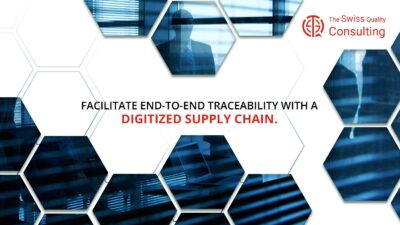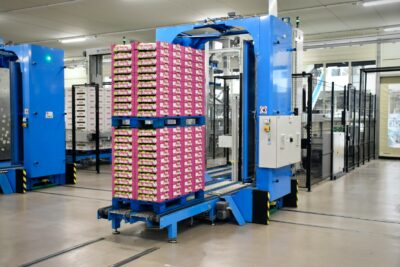The Role of Smart Contracts in Modern Supply Chains
Improving Transaction Traceability
The integration of smart contracts in supply chain finance is revolutionizing the way businesses in Saudi Arabia and the UAE manage their operations. Smart contracts, which are self-executing contracts with the terms of the agreement directly written into code, provide unparalleled traceability and transparency in transactions. By leveraging blockchain technology, these contracts ensure that every step of a supply chain process is recorded and verifiable, making it easier to track the movement of goods and payments.
In Riyadh and Dubai, where business activities are rapidly expanding, the need for efficient and transparent supply chain management is paramount. Smart contracts address this need by automating and securing transactions, reducing the reliance on manual processes and the potential for human error. Each transaction is recorded on a decentralized ledger, which is accessible to all parties involved, ensuring complete visibility and accountability.
This level of traceability is particularly beneficial in complex supply chains involving multiple stakeholders. For instance, a manufacturer in Dubai can use smart contracts to track the delivery of raw materials from suppliers, ensuring that all transactions are completed according to agreed terms. This reduces the risk of disputes and enhances trust between parties, fostering a more collaborative and efficient supply chain ecosystem.
Enhancing Transparency and Reducing Fraud
One of the most significant advantages of using smart contracts in supply chain finance is the enhanced transparency they provide. Every transaction, from the initial order to the final payment, is recorded on the blockchain, creating a tamper-proof record that all parties can access. This transparency helps to reduce the risk of fraud, as any unauthorized changes or discrepancies can be easily detected and addressed.
In addition to fraud reduction, the use of smart contracts ensures that all parties adhere to the agreed terms and conditions. Payments are automatically triggered when predefined conditions are met, eliminating the need for intermediaries and reducing the likelihood of payment delays. This is particularly important for businesses in Saudi Arabia and the UAE, where timely payments are crucial for maintaining smooth operations and good business relationships.
The implementation of smart contracts also supports compliance with regulatory requirements. In highly regulated industries such as pharmaceuticals and food, ensuring that all transactions are transparent and traceable is essential for meeting legal and safety standards. By using smart contracts, businesses can easily demonstrate compliance and avoid the risk of penalties or reputational damage.
Case Studies: Successful Implementations in Saudi Arabia and UAE
Saudi Arabia: Vision 2030 and Blockchain Innovation
Saudi Arabia’s Vision 2030 initiative aims to diversify the economy and promote technological innovation. As part of this vision, the adoption of blockchain technology and smart contracts is seen as a key driver of economic growth and efficiency. Several pilot projects have been launched to explore the potential of these technologies in enhancing supply chain finance.
One notable example is the partnership between the Saudi Arabian Oil Company (Saudi Aramco) and blockchain startups to implement smart contracts in their supply chain processes. By using smart contracts, Saudi Aramco can ensure that all transactions with suppliers are transparent and secure, reducing the risk of fraud and enhancing operational efficiency. This initiative aligns with the broader goal of Vision 2030 to create a more innovative and resilient economy.
The success of these pilot projects is encouraging other businesses in Saudi Arabia to explore the use of smart contracts. From logistics companies to retail chains, businesses are recognizing the benefits of enhanced traceability and transparency in their supply chains. As more companies adopt this technology, Saudi Arabia is poised to become a leader in blockchain innovation and supply chain management.
UAE: Dubai’s Smart City Vision and Blockchain Adoption
Dubai’s ambition to become a global leader in smart city innovation is driving the adoption of blockchain and smart contracts in various sectors. The Dubai Blockchain Strategy aims to make Dubai the first city fully powered by blockchain by 2020, and supply chain finance is a key focus area of this strategy. The government and private sector are collaborating to implement blockchain solutions that enhance efficiency and transparency in supply chains.
One successful implementation is the partnership between Dubai Customs and blockchain technology providers to create a blockchain-based platform for tracking goods and transactions. This platform uses smart contracts to automate and secure transactions, ensuring that all parties have access to real-time information about the status of shipments and payments. This reduces the risk of fraud and delays, improving overall efficiency and customer satisfaction.
In addition to government initiatives, private companies in Dubai are also leveraging smart contracts to streamline their supply chain processes. For example, major retailers are using blockchain platforms to manage their inventory and supplier relationships, ensuring that all transactions are transparent and traceable. This not only enhances operational efficiency but also builds trust with customers and partners, positioning Dubai as a hub for innovative and reliable supply chain management.
Conclusion
The integration of smart contracts in supply chain finance is transforming the way businesses in Saudi Arabia and the UAE operate. By enhancing traceability, transparency, and efficiency, smart contracts provide significant benefits for managing complex supply chains and reducing the risk of fraud. As these regions continue to embrace digital innovation and blockchain technology, the adoption of smart contracts is set to play a crucial role in driving economic growth and business success. With initiatives like Vision 2030 and the Dubai Blockchain Strategy, Saudi Arabia and the UAE are leading the way in creating a more transparent, efficient, and secure global supply chain ecosystem.
—
#SmartContracts #SupplyChainFinance #TransactionTraceability #Transparency #TimelyPayments #FraudReduction #SaudiArabia #UAE #Riyadh #Dubai #ArtificialIntelligence #Blockchain #Metaverse #GenerativeAI #ModernTechnology #BusinessSuccess #Leadership #ManagementSkills #ProjectManagement























